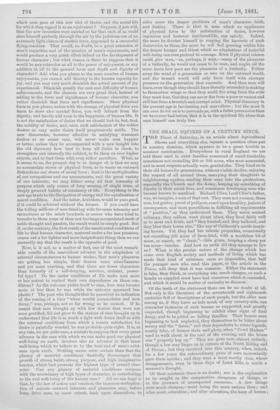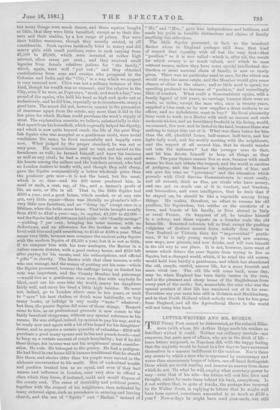THE SMALL SQUIRES OF A CENTURY SINCE.
THE Ti9no8 of Saturday, in an article about Agricultural Shows and everything else, repeats a question often put in country districts, which appears to be a groat trouble to amateur sociologists. Everywhere in rural England we are told there used to exist families possessed of small freeholds, sometimes not exceeding 200 or 300 acres, who were accounted, and in most respects actually were, gentlefolks. They lived on in their old houses for generations, without visible decline, enjoying the respect of all around them, marrying their daughters to neighbouring squires, sending their sons into the professions, especially the Church and the Army, keeping up something of dignity in their social lives, and sometimes developing sons who became known to mankind. Richard Clive, Lord Clive's father, was, we imagine, a man of that sort. They were not yeomen, these men, but gentry, proud of pedigree, exact upon heraldry, jealous of consequence, and most punctilious in fulfilling all requirements of " position," as they understood them. They never seemed unhappy, they seldom went about afoot, they lived fairly well as to meat and drink, and " they hunted, and they hallooed, and they blew their horns also," like any of Caldecott's mirth-inspir- ing heroes. Yet they had but minute properties, occasionally not exceeding 200 acres of farm-land, with a worthless bit of moor, or marsh, or " chase,"—thin grass, keeping a sheep per ten acres—besides. And how on earth did they manage to live so ? What is the precise nature of the change which has come over English society and methods of living which has made that kind of existence seem so impossible, that half the younger men who read this paper, or the article in the Times, will deny that it was common. Either the statement is false, they think, or everything was much cheaper, or such a family so supplied must have bad. resources which it concealed, and which it would be matter of curiosity to discover.
Of the truth of the statement there can be no doubt at all. Not only is the literature of the seventeenth and eighteenth centuries full of descriptions of such people, but the older men among us, if they knew as lads much of any country-side, can remember instances of such houses so supported, and greatly respected, though beginning to exhibit clear signs of final decay, and to be pitied as failing families. Their houses were beginning to look neglected, they themselves to be bitter about money and the "times," and their dependents to relate legends, mostly false, of former state and glory, when " t'owd Madam" used to walk about in the cool of the evening, and the house was "properly hop up." They are gone now, almost entirely, though a few may linger on in corners of the North Riding and of Devon ; but they survived into this century, when, indeed, for a few years the extraordinary price of corn momentarily gave them spirits ; and they were a most worthy class, whose disappearance, even in these days of Land Bills, is worth a moment's thought.
Of their existence there is no doubt; nor is the explanation to be sought in the comparative cheapness of things, or in the presence of unsuspected resources. A few things were much cheaper,—meat being the most serious item ; and after meat, education ; and after education, the keep of horses ; but many things were much dearer, and these squires bought " Mr." and " Mrs.," gave him independence and boldness, and. so little, that they were little benefited, except as to their din- made his pride in heraldic distinctions and claims of family ners and their stables, by a low range of prices. Nor were anything but ridiculous,
their hidden resources, though they usually existed, at all The little Squire possessed, in fact, as the beneficed. considerable. Such squires habitually tried to marry and. did Rector alone in. England perhaps still does, that kind marry .girls with small portions, sums in cash varying from of respect that equality with all but the very first—that 21,500 to £3,000, which were invested at rather high " position " as it is now called—which is, after all, the result interest, often seven per cent. ; and they received small for which money is so much valued, and which to men legacies from female relatives jealous for " the family," without means, unless they have some special intellectual dis- which, again, were well " put out ;" and they obtained tinction or some unusual claim of family, is now so rarely contributions from sons and cousins who prospered in the given. ' There was no particular need to save, for the eldest son Colonies and India and the " City," in a way which we suspect would enjoy the same estate, and the Member would give some is very unusual now. Clive was not a solitary instance of this chance or other to the others ; and as little need to spend, for kind, though his wealth was so unusual; and the relative in the spending produced no increase of " position," and exceedingly City, even if he were, as Pope says, "meek, and much a liar," was little of comfort. What could a Somersetsbire squire, with a proud of the squire, who held his head so high and spoke out so family legend of 300 years, no carriage, because there were no audaciously, and he did him, especially as to investments, many a roads, no tailor, except the man who, once in twenty years, good turn. The secret did not, however, consist in the possession supplied a blue coat, as lie now supplies a dress uniform to an of resources apart from the estate, any more than it did in the officer, and no upholsterer, want to buy ? He lived pleasantly low price for which Madam could purchase the 'week's supply of from week to week, as a Rector with such an income and sueh meat. The explanation consists, we believe, substantially in this: moderate wishes, and an hereditary freehold in his living, would, that apart from his horseflesh, which so greatly helped his dignity, we contend, live now, and be lasted in the land, because there was and which is now quite beyond. reach, the life of the poor 14-Ing- nothing to tempt him out of it. What was there bettor for him lish Squire who was accepted. as a gentleman could, were social than the old, plentiful house, half-manor, half-farm, and his conditions the same, be lived successfully and happily even light daily work, and his weekly meeting with the neighbours, now. When judged by the proper standard, he was not so and the respect of all around him, that he should wander very poor. His manor-house paid no rent, and served as the out into the unknown ? Let the younger sous do that, farmhouse as well ; he farmed himself, and knew his business and let him devote himself to keep all things as they as well as any rival; he had a ready market for his corn and were. The poor Squire cannot live so now, because with small his beasts among the millers and the butchers around, who had means he does not obtain the respect, and the world is careless no London dealers to traffic with, and though they sold cheap, of pedigree, and the Member is independent of him, and gave the Squire comparatively a better wholesale price than can give his sons no " provision," and. the education which the producer gets now—it is not the beast, but the meat, prevails with Civil Service Commissioners is - most costly, which is so dear—and his 200 acres produced him, in and all around, thick as flies, are rivals who have money, meal or malt, a rent, say, of 18s., and a farmer's profit of and. can get so much out of it in comfort, and freedom, 12s. an acre, or 30s. in all. That is, the little Squire had and locomotion, and even intelligence, that he feels that if £300 a year, auks good house, which needed, or at any rate he stayed on, he should be like a vegetable among living got, very little repair—there was literally no plumber's bill— things. He • makes, therefore, no effort to resume his old very little new furniture, and no " doing up," except once in a position, his Sqairecloin, but settles on the outskirts of a lifetime, when the bride came home. That bride brought usually town, and boasts of his family, or lives abroad in Italy from £105 to £140 a year—say, in capital, 21,600 to £2,000— or rural France. Or happiest of all, he betakes himself and the Squire had 4,000 more laid aside—old "family savings" to a colony, and there repeats on a broader scale the old —yielding 7 per cent., bringing his total income, with no home-life. Returned colonists toll us that, except the ptishing deductions, and no allowance for the brother or uncle who vulgarian of distinct mental force, nobody does better in lived with him and paid something, to £345 or £590 a year. That New Zealand or Victoria than the " impoverished " gentle- seems very little, because men compare the ancient petty Squire man, if he is only young enough to accept new seasons, with the modern Squire of 22,500 a year, but it is not so little, new ways, new grasses, and new drinks, and will root himself if we compare him with his true analogue, the Rector in a in the old way to one place. It is not, however, mere want of rather remote district, with a good rectory house, and 2550 left means which deters the poor Squire from trying to live as after paying for his curate, and his subscriptions, and official Squire, but a changed world, which, if he tried the old course, " gifts " in charity. The Rector with that clear income, a wife would hold him hardly a gentleman, and which has abandoned who can manage, and the means of putting out his sons—which the old, simple, restful, narrow life, for a more feverish and. the Squire possessed, because the suffrage being so limited his more vivid one. The old lifo will come back, sonic day, vote was important, and the County Member had patronage may be, when England has been fairly beaten in the race, —would live as a gentleman even now, dine with anybody he and is the pleasant and cheap home of the Englishman from liked, send out his sons into the world, marry his daughters every part of the earth ; but, meanwhile, the man who was the fairly well, and carry his head a little high besides. He must special product of that life has wandered out of it for ever. not, indeed, go to London above once in ten years, or omit Travellers say you meet him still in Holstein and Mecklenburg, to " save " his best clothes, or drink wine habitually, or buy and in that North Holland which nobody sees ; but he has gone many books, or indulge in any costly " taste " whatever ; from England, and all the Agricultural Shows in the world but then, the poorer Squire did none of these things. Respect will not bring him back.
came to him, as on professional grounds it now comes to the fairly beneficed clergyman, without any special reference to his LETTER-WRITERS AND MR. RUSKIN.
purchase a good many spoons and ladles and punch-bowls—and these things, his income was not his neighbours' great consider- (Ilion. He rode. He belonged to the gentry. He had a pedigree. He had lived in one house till it became traditional that he should

































 Previous page
Previous page